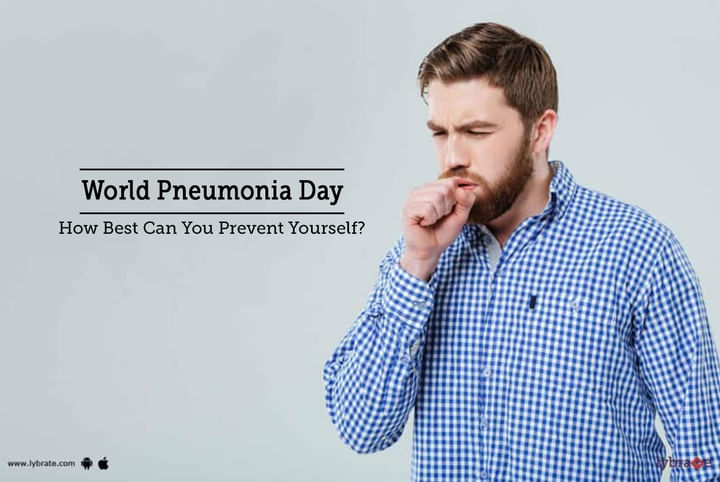World Pneumonia Day - How Best Can You Prevent Yourself?
The world celebrates World Pneumonia Day on 12 November. As we all know, pneumonia, the world's greatest killer of children under five, is a respiratory illness. Pneumonia is a type of lung infection that may affect one or both lungs. In this condition, the air sacs, also known as alveoli, fill with pus or fluid, which makes it difficult to breathe. Moreover, pneumonia is known to cause inflammation in the air sacs. This disease may range from mild to life-threatening and the severity depends on the cause of inflammation, the organism fostering your infection, your age and general health.
Symptoms:
Most common symptoms associated with the condition are:
- Chest pain
- Difficulty in breathing
- Shaking chills
- Rapid heartbeat
- Fever
- Rapid breathing
- Dry cough
- Vomiting
- Wheezing
- Nausea
- Muscle aches
- Bluish skin tone due to oxygen deficiency
- Blood in sputum that is coughed up mucus
- Labored breathing
- Confusion
- High fever
Causes:
- Bacteria: One of the most common causes of pneumonia is the bacteria named as Streptococcus pneumoniae. This type of pneumonia may occur after you have had flu or a cold or maybe even on its own. Moreover, it may affect only one part of the lung i.e. the lobe and is also known as lobar pneumonia.
- Viruses: Viruses are one of the main reasons why children below 5 years of age suffer from pneumonia. Viruses that cause pneumonia may also cause cold or flu. Viral pneumonia is usually mild and may be treated at home itself. However, in some cases, it may be very severe and life-threatening.
- Mycoplasmas: Mycoplasma is a type of bacteria that doesn't have a cell wall around the cell membrane which is why they are usually unaffected by most antibiotics which target cell wall synthesis. The symptoms of pneumonia caused by mycoplasmas are mild and the patient does not require bed rest. This type of pneumonia is known as 'Walking Pneumonia'.
- Fungi: People with weakened immune systems or chronic health problems usually develop pneumonia due to fungi. You may also develop fungal pneumonia by inhaling large doses of it mainly found in soil or bird droppings.
Prevention against Pneumonia
It is important for all of us to prevent ourselves from pneumonia and for that we can follow the below mentioned steps:
- Know about the symptoms of pneumonia first: It is difficult to detect or diagnose pneumonia, especially in people over the age of 65. In older patients, the common symptoms such as fever, chills, cough may not be experienced. You should watch out for non-respiratory symptoms like weakness, dizziness, delirium and confusion. It is even more difficult to diagnose pneumonia in people who are suffering from preexisting conditions.
- Practice good hygiene: Common respiratory Infections, influenza and cold may cause pneumonia. You should follow hygienic habits. Wash your hands regularly before meals and use hand sanitizers in order to prevent the illness from spreading. You should also maintain proper oral hygiene as several oral infections may also lead to pneumonia. You should also keep away from people who are affected by pneumonia or any other illness like flu, cold and serious diseases such as measles or chicken pox. All these factors may cause pneumonia.
- Get vaccinated: It is recommended for people of all ages who may be at a risk of getting pneumonia to get vaccinated and immunized against pneumonia causing virus called pneumococcal pneumonia. This is a one-time vaccine, which prevents and reduces the severity of pneumonia. A booster vaccine after every five years may also be prescribed. Elderly people should be vaccinated against all diseases which cause pneumonia.
- Quit smoking: Smoking accounts for being a major cause or risk factor for pneumonia. It increases a person’s chance of getting pneumonia as the lungs’ ability to defend themselves from the infection is reduced. By quitting smoking, you will be able to prevent pneumonia.
- Maintain a good general health: Maintaining an overall good health and following healthy habits will help you in preventing pneumonia. This is because your immune system stays strong and is able to fight efficiently against pneumonia-causing infections. A proper diet with all essential nutrients is also recommended along with regular physical exercise and proper rest.
Severe cases of pneumonia are capable of making you suffer and you may be admitted to a hospital. According to studies, it has been estimated that more than 60% of people over the age of 65 need to be hospitalised because of pneumonia. If you wish to discuss about any specific problem, you can consult a pulmonologist.



+1.svg)
